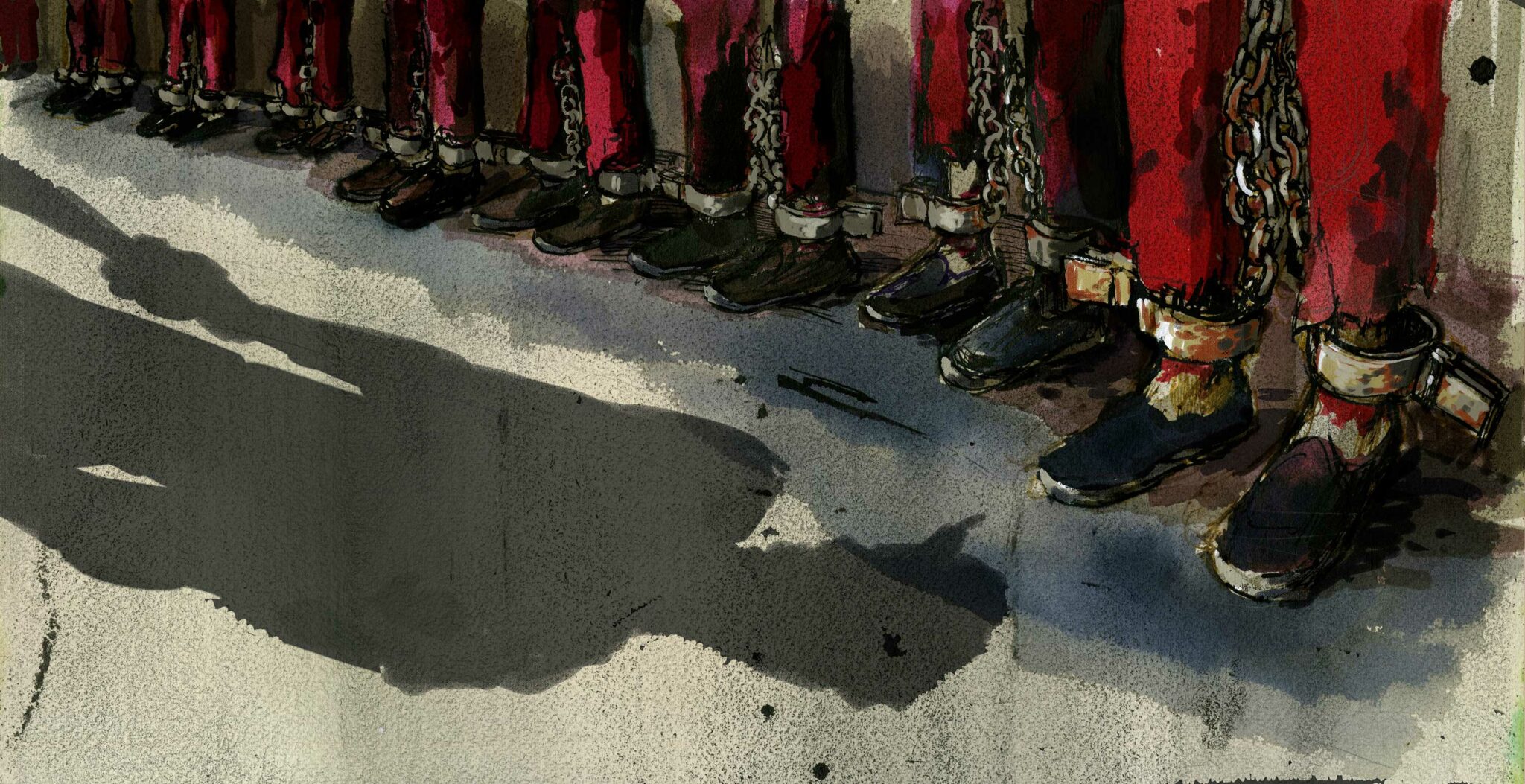‘Education’ in internment camps
At some point after arriving in camp, nearly all detainees were subjected to highly regimented classes, either in person, via video lectures, or both. The classes were mostly about Chinese language, history, law, and “ideology”. Some involved memorizing and reciting red songs. The typical schedule included three or four hours of class after breakfast. Then detainees had lunch and a short “rest”, which often involved sitting still on a stool or with their heads still on their desks. [[[Amnesty International interviews.]]] After lunch there was another three or four hours of classes and then dinner, followed by a few hours to sit or kneel on a stool and silently “review” the day’s material or to watch more “educational” videos. [[[Amnesty International interviews.]]] At nearly all times during classes, detainees were required to look straight ahead and not to speak with their classmates.
Classes were usually held in classrooms outside the cells. Inmates from two or more cells were regularly brought together in one larger class with approximately 50 people. Former detainees also reported having classes in their cell.
Detainees often had to line up or sit and wait for hours in the morning because of the logistical constraints of transferring thousands of people from cells to classrooms, especially when they had to walk through narrow fenced enclosures – in essence cages – to get from the building where their cells were to the building where the classrooms were. [[[Amnesty International interviews.]]] Aibek told Amnesty he spent a large portion of the day waiting to be escorted to class: “After classes started, we got moving at 6am. It took two to three hours to send all inmates to class. The class was 1km away. The cage line, beginning from the dorm [and leading] to the class, was really narrow and we could only walk single file. It took two to three hours for everyone to get there.” [[[Amnesty International interviews.]]]
While walking to the classroom – or anywhere else in the camp – detainees had to walk between yellow lines painted on the ground of the facility. [[[Amnesty International interviews.]]] Anyone who stepped on or over the lines risked physical punishment. Meryemgül, who said she had been sent to a camp because she refused to work for the government, told Amnesty she remembered a staff member speaking about the two yellow lines on the floor of the camp. The guard reportedly said, “‘You people went outside of the path. Here you will learn to go inside the path.’” [[[Amnesty International interviews.]]]
Detainees were escorted to class by guards. Some guards had shields and electric batons. [[[Amnesty International interviews.]]] When travelling from the cell to the classroom, detainees sometime walked outside to another building but were almost always in some sort of caged enclosure. “The roads from the dorm to the classroom were surrounded by wires and armed guards who looked like they were ready to shoot you,” Aibek said. [[[Amnesty International interviews.]]] Detainees were often required to march to class in a military-type formation, shouting slogans. [[[Amnesty International interviews.]]] Meryemgül told Amnesty that inmates were required to march to and from class “like soldiers” and that while marching they were required to shout, “Study hard, elevate yourself, eliminate separatist forces, and long live Xi Jinping!” [[[Amnesty International interviews.]]]
The teacher and guards entered the classroom using one door and the students entered through another, which, like the cell doors, was chained to the wall. Classes began and ended with the class thanking the teacher for their sacrifice. [[[Amnesty International interviews.]]] Students and teachers were physically separated at all times. Classrooms had a hard plastic, wooden, or metal divider, over a metre high, separating the students from the teachers and guards. [[[Amnesty International interviews.]]] A wire or metal screen often filled the space above the divider. Some former detainees and one person who worked as a guard at a camp reported that there were multiple guards with weapons in the classroom with them at all times. [[[Amnesty International interviews.]]] “[In my class] there were three guards on the same side as the teacher. They wore police uniforms… They wore bullet-proof vests… They had a metal shield that was about 1m high… One had a long spear; it was longer than the guard’s height.” [[[Amnesty International interviews.]]]
Desks and stools in the classroom were often attached, and sometimes chained together. [[[Amnesty International interviews.]]] Former detainees reported being given short pencils to write with, or only the plastic tube of ink and tip from a disposable pen; they presumed this was because a full-size pencil or a pen could be used as a weapon. [[[Amnesty International interviews.]]] Kanat described his experience in the classroom:
Every day was almost the same… We were brought to a place where you had to sit for 17 hours. It was in another room in the same building. [In the classroom] there were five or six armed guards and a teacher. The door to the class was also chained, you must crawl to get in… The teacher was behind a barrier, maybe neck height. You could see them, but you couldn’t cross [the barrier]. The guards were on the teacher’s side. They taught us verses from Confucius. We had to read [the verses] out loud and repeat them hundreds of times. And there were loudspeakers in the classroom. Several times I heard [a voice on the loudspeaker saying], ‘Give more pressure.’ [[[Amnesty International interviews.]]]
Detainees were made to sit absolutely straight while at their desks. Former detainees reported people being taken out of class and beaten or otherwise punished if they did not sit straight and look straight ahead. [[[Amnesty International interviews.]]] Meryemgul told Amnesty International that failure to sit straight could also affect a detainee’s score: “We had to sit straight with our hands behind our back. In our classroom, there were old women. Their hands and feet swelled up. If you missed your home, if you cried, they would deduct from your score – they gave scores to everyone – and they would say that your mind still had problems, that your ideas hadn’t changed.” [[[Amnesty International interviews.]]]



